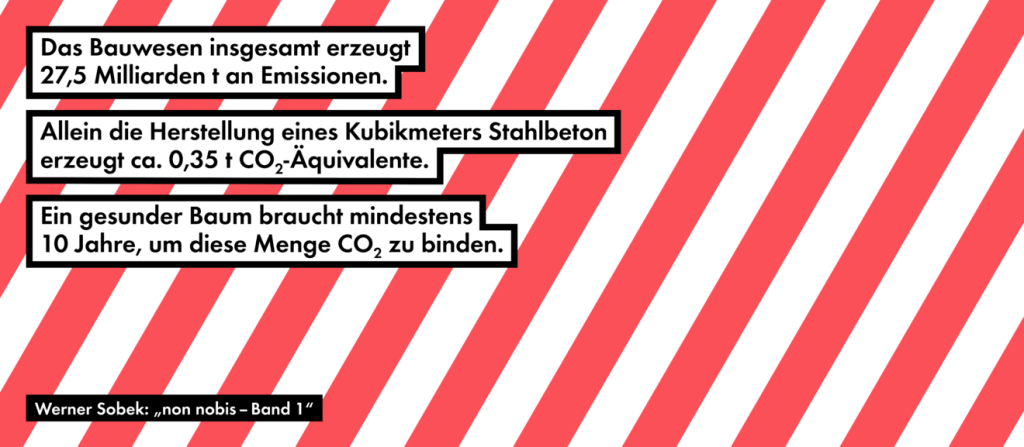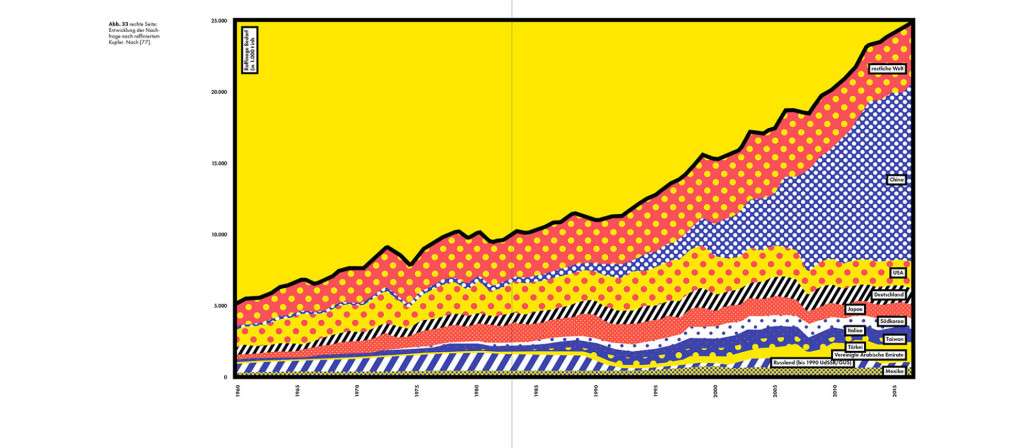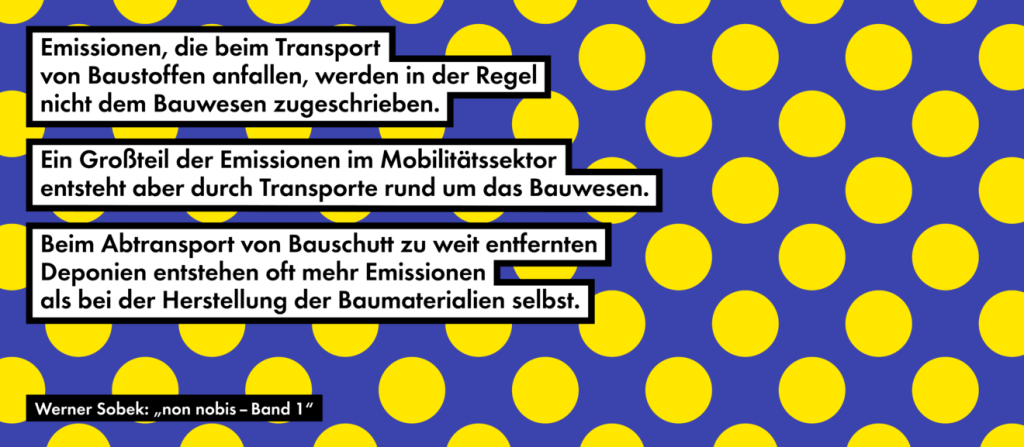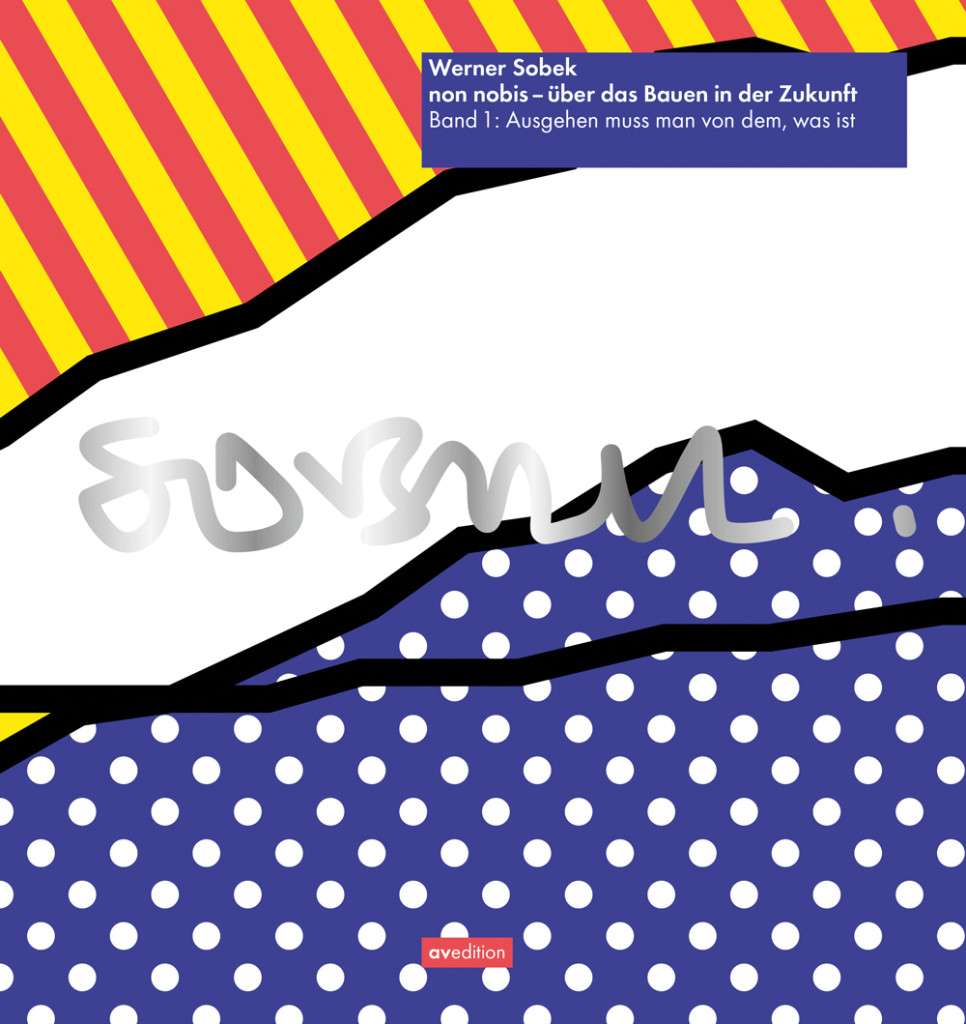
There is an urgent need for action in the direction of a circular economy: Werner Sobek is one of the world’s most renowned engineering scientists and construction researchers. With the first volume of “non nobis – on building in the future”, he presents an alarming inventory of the environmental deficits of the construction sector.
Review by Thomas Wagner
“Industrial modernity”, writes climate researcher Hans Joachim Schellnhuber in a foreword to Werner Sobek’s book, “has brought about – as unintentionally as it has unthinkingly – a new Earth age: In the ‘Anthropocene’ (after Paul Crutzen), humanity has become a geological force that is beginning to break through the planetary boundaries at its own peril. The exponentially increasing exploitation of mineral resources (fossil energy sources, metal ores, stones, earths, etc.) since the middle of the 20th century is acutely responsible for two crises threatening civilisation, namely the abrupt change of the climate and the radical transformation of the living world.” The conclusion Schellnhuber draws from this is clear: “Only if we take the final exit into a bio-based and largely regionalised circular economy in the next two decades can the aforementioned crises still be overcome. The key area for this, which has received little attention so far, is the built environment.”
Living Up to our Shared Responsibility
No one is an island. In times of globalisation, interconnectedness and climate crisis, the saying has taken on a gloomy, melancholic tone. What each individual does may be important; in the end, however, what is decisive is what we do as a society – and how we thereby influence the future from the present. “In order to do justice to our common responsibility,” says Werner Sobek, “we need cleanly researched facts and a precise presentation of the connections between these facts. Only in this way can knowledge emerge!”
With volume 1 of his trilogy “non nobis”, Sobek presents the first comprehensive and up-to-date analysis of the construction industry. The title “non nobis” alludes to a Latin motto (varied many times) dating back to Cicero: “non nobis solum nati sumus ortusque nostri partem patria vindicat, partem amici” – Not only for us are we born; our country, our friends, have a share in us. Sobek thus already refers in the title to the responsibility for the whole, to the fact that people should not only pursue their own interests but contribute to the general welfare of humanity.
Comprehensive Inventory
“You have to start from what is”: What Sobek undertakes in the first volume is nothing less than an attempt to take comprehensive stock of current trends and developments. These directly affect the natural and built environment and are massively influenced by the way we build today: resource consumption and availability, building materials, emissions, energy, global warming, climate targets, population development and much more. Sobek relies on objectivity, provides figures and data, and trusts (in the first volume he does not yet want to draw any conclusions) in the effect of graphically appealingly prepared diagrams.

Colorfully Confronting the Ugly
In design, it can be taken for granted: The form in which something is presented is anything but indifferent. Of course, first impressions can turn out to be wrong; but what appears likeable, exciting, different in an exciting way or simply inviting at first glance has a good chance of being perceived more closely. The status quo described by Werner Sobek may list plenty of deficits – visually, the book designed by Büro Uebele exudes such freshness and cheerfulness that sceptical looks brighten up and one is ready to believe in a positive future. Andreas Uebele and his team took a similar view when they state: “We have presented the startling and unfortunately also complex facts of climate change compiled by Werner Sobek as beautifully as possible so that they get the attention they deserve. We have redrawn previously inconsistent and incomprehensible graphics to make the facts they depict accessible and understandable – after all, the recognition of facts is the starting point of all knowledge. The beautiful form is our contribution when it comes to confronting the ugly.”

Alarming Core Statements
The core statements resulting from Sobeck’s analysis are intended to enlighten, but also to awaken: (1) The construction industry is largely responsible for the worldwide emission of climate-damaging gases and the overexploitation of nature and resources. (2) Construction accounts for more than 50 % of global material consumption. (3) In the list of material-consuming industries, the construction industry ranks first worldwide; and the demand for building materials continues to increase dramatically. (4)Construction contributes more than 50 % to the approximately 400 million tonnes of waste generated each year in Germany alone. (5)The use of buildings accounts for about 30 % of the world’s final energy consumption, which is mainly covered by fossil sources and wood. The production and demolition of buildings account for (at least) an equal share, but this has received little attention so far. (6) Although the main emitters and possible absorbers are known, CO2 emissions continue to increase. (7) A large part of energy consumption and emissions in the mobility sector are caused by transport in the building sector, but are often attributed to other sectors.

Werner Sobek uses facts and figures to combat the concealment of the true interrelationships. And so his sober conclusion is: since the building industry is largely responsible for the emission of climate-damaging gases, the consumption of precious materials from nature and toxic waste, it must finally act responsibly. A prerequisite for this is: instead of carrying on as before, construction, with all its concerns and its effects on global warming and the destabilisation of our natural environment, must be understood as a sector in its own right.
There is no shortage of information. The facts, as far as they are available, are on the table. The following volumes will explore the scope for action and design that still remains for a building industry that responsibly sets the course for a better future today. We can look forward to the publication of the second volume, which has been announced for August.

Werner Sobek
non nobis – über das Bauen in der Zukunft
Band 1: Ausgehen muss man von dem, was ist
hardcover, 292 p., 114 illustrations,
Design: Andreas Uebele
avedition, Stuttgart 2022
ISBN 978-3-89986-369-7
49 Euro
Please note that the book is only available in german.
- “non nobis” on Werner Sobek’s website: https://www.wernersobek.com/topics/non-nobis-about-building-in-the-future/
- Project “non nobis” by Büro Uebele: www.uebele.com/de/projekte/print/non-nobis.html#1
- “non nobis” on the publisher’s website: www.avedition.de/de/non-nobis-ueber-das-bauen-in-der-zukunft-band-1-ausgehen-muss-man-von-dem-was-ist
More on ndion
More reviews and articles on the topic of architecture.
Share this page on social media:

